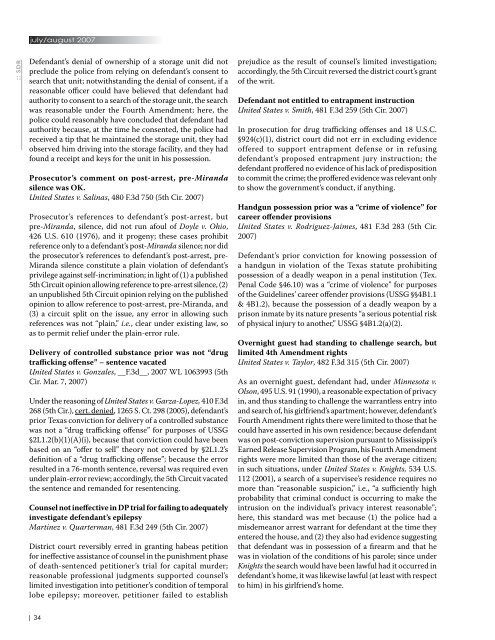M - Voice For The Defense Online
M - Voice For The Defense Online
M - Voice For The Defense Online
Create successful ePaper yourself
Turn your PDF publications into a flip-book with our unique Google optimized e-Paper software.
july/august 2007<br />
:: sDR<br />
Defendant’s denial of ownership of a storage unit did not<br />
preclude the police from relying on defendant’s consent to<br />
search that unit; notwithstanding the denial of consent, if a<br />
reasonable officer could have believed that defendant had<br />
authority to consent to a search of the storage unit, the search<br />
was reasonable under the Fourth Amendment; here, the<br />
police could reasonably have concluded that defendant had<br />
authority because, at the time he consented, the police had<br />
received a tip that he maintained the storage unit, they had<br />
observed him driving into the storage facility, and they had<br />
found a receipt and keys for the unit in his possession.<br />
Prosecutor’s comment on post-arrest, pre-Miranda<br />
silence was OK.<br />
United States v. Salinas, 480 F.3d 750 (5th Cir. 2007)<br />
Prosecutor’s references to defendant’s post-arrest, but<br />
pre-Miranda, silence, did not run afoul of Doyle v. Ohio,<br />
426 U.S. 610 (1976), and it progeny; these cases prohibit<br />
reference only to a defendant’s post-Miranda silence; nor did<br />
the prosecutor’s references to defendant’s post-arrest, pre-<br />
Miranda silence constitute a plain violation of defendant’s<br />
privilege against self-incrimination; in light of (1) a published<br />
5th Circuit opinion allowing reference to pre-arrest silence, (2)<br />
an unpublished 5th Circuit opinion relying on the published<br />
opinion to allow reference to post-arrest, pre-Miranda, and<br />
(3) a circuit split on the issue, any error in allowing such<br />
references was not “plain,” i.e., clear under existing law, so<br />
as to permit relief under the plain-error rule.<br />
Delivery of controlled substance prior was not “drug<br />
trafficking offense” – sentence vacated<br />
United States v. Gonzales, __F.3d__, 2007 WL 1063993 (5th<br />
Cir. Mar. 7, 2007)<br />
Under the reasoning of United States v. Garza-Lopez, 410 F.3d<br />
268 (5th Cir.), cert. denied, 1265 S. Ct. 298 (2005), defendant’s<br />
prior Texas conviction for delivery of a controlled substance<br />
was not a “drug trafficking offense” for purposes of USSG<br />
§2L1.2(b)(1)(A)(i), because that conviction could have been<br />
based on an “offer to sell” theory not covered by §2L1.2’s<br />
definition of a “drug trafficking offense”; because the error<br />
resulted in a 76-month sentence, reversal was required even<br />
under plain-error review; accordingly, the 5th Circuit vacated<br />
the sentence and remanded for resentencing.<br />
Counsel not ineffective in DP trial for failing to adequately<br />
investigate defendant’s epilepsy<br />
Martinez v. Quarterman, 481 F.3d 249 (5th Cir. 2007)<br />
District court reversibly erred in granting habeas petition<br />
for ineffective assistance of counsel in the punishment phase<br />
of death-sentenced petitioner’s trial for capital murder;<br />
reasonable professional judgments supported counsel’s<br />
limited investigation into petitioner’s condition of temporal<br />
lobe epilepsy; moreover, petitioner failed to establish<br />
prejudice as the result of counsel’s limited investigation;<br />
accordingly, the 5th Circuit reversed the district court’s grant<br />
of the writ.<br />
Defendant not entitled to entrapment instruction<br />
United States v. Smith, 481 F.3d 259 (5th Cir. 2007)<br />
In prosecution for drug trafficking offenses and 18 U.S.C.<br />
§924(c)(1), district court did not err in excluding evidence<br />
offered to support entrapment defense or in refusing<br />
defendant’s proposed entrapment jury instruction; the<br />
defendant proffered no evidence of his lack of predisposition<br />
to commit the crime; the proffered evidence was relevant only<br />
to show the government’s conduct, if anything.<br />
Handgun possession prior was a “crime of violence” for<br />
career offender provisions<br />
United States v. Rodriguez-Jaimes, 481 F.3d 283 (5th Cir.<br />
2007)<br />
Defendant’s prior conviction for knowing possession of<br />
a handgun in violation of the Texas statute prohibiting<br />
possession of a deadly weapon in a penal institution (Tex.<br />
Penal Code §46.10) was a “crime of violence” for purposes<br />
of the Guidelines’ career offender provisions (USSG §§4B1.1<br />
& 4B1.2), because the possession of a deadly weapon by a<br />
prison inmate by its nature presents “a serious potential risk<br />
of physical injury to another,” USSG §4B1.2(a)(2).<br />
Overnight guest had standing to challenge search, but<br />
limited 4th Amendment rights<br />
United States v. Taylor, 482 F.3d 315 (5th Cir. 2007)<br />
As an overnight guest, defendant had, under Minnesota v.<br />
Olson, 495 U.S. 91 (1990), a reasonable expectation of privacy<br />
in, and thus standing to challenge the warrantless entry into<br />
and search of, his girlfriend’s apartment; however, defendant’s<br />
Fourth Amendment rights there were limited to those that he<br />
could have asserted in his own residence; because defendant<br />
was on post-conviction supervision pursuant to Mississippi’s<br />
Earned Release Supervision Program, his Fourth Amendment<br />
rights were more limited than those of the average citizen;<br />
in such situations, under United States v. Knights, 534 U.S.<br />
112 (2001), a search of a supervisee’s residence requires no<br />
more than “reasonable suspicion,” i.e., “a sufficiently high<br />
probability that criminal conduct is occurring to make the<br />
intrusion on the individual’s privacy interest reasonable”;<br />
here, this standard was met because (1) the police had a<br />
misdemeanor arrest warrant for defendant at the time they<br />
entered the house, and (2) they also had evidence suggesting<br />
that defendant was in possession of a firearm and that he<br />
was in violation of the conditions of his parole; since under<br />
Knights the search would have been lawful had it occurred in<br />
defendant’s home, it was likewise lawful (at least with respect<br />
to him) in his girlfriend’s home.<br />
| 34

















